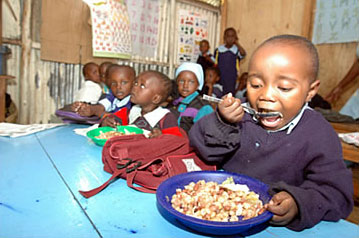Subsidized meals in public schools at 100 francs. The commune of Yène officially launched on Thursday its central kitchen which will allow the pupils of the public establishments to eat at school. It is from the central kitchen, built over a period of three months for an amount of 20 million francs, that the meals will be delivered to the different middle and secondary schools.
This is a significant action in a region where some students travel no less than 10 kilometers, according to Mayor Gorgui Ciss, to reach the school. “The launch of the central kitchen follows the signing of an agreement with the Grdr (French NGO working for development in West Africa) last January. And the objective was to do everything possible to ensure that the central kitchen is functional as soon as possible,” said the mayor of Yene in his speech. “The students will be able, on days of classes in the afternoon, to eat and continue classes without leaving their institution,” said Pr Ciss, appreciating the initiative as an adjuvant to the quality of learning for the beneficiaries mainly composed of students from modest families and those whose homes are too far from the place of learning. “All specialists and studies have shown that there is a clear relationship between good nutrition and the quality of education, but also the performance of students,” he noted. “As an institution, we are committed to doing everything possible to ensure that the structure is sustainable,” said the mayor of Yene, calling for the support of goodwill. According to the mayor, at the beginning of the project, 750 students have already been enrolled. “That’s 112 kg of rice per day,” he said for these beneficiaries, hoping to reach 1,000 beneficiaries before the end of the school year.
The ceremony was followed by a similar one in Rufisque. Souleymane Ndoye, President of the Departmental Council, also launched the central kitchen of the modern high school of Rufisque. That of Yène is indeed part of the overall framework of the project Support for the implementation of the food plan of Rufisque (AMOPAR), implemented in 2019 by the Departmental Council of Rufisque. “The operation of the central kitchen of the Lycée moderne de Rufisque, in a test phase since December 2020 with seven institutions in the department, has finished declining the opportunity to perpetuate and expand this program to all municipalities,” made Souleymane Ndoye understand, believing that this momentum around school food is one of the axes of the AMOPAR project. As a precursor in the Dakar region on this practice, Rufisque, which has been a laboratory of experimentation of the practice must inspire other communities for the multiplication and sustainability of the initiative, according to the President of the Departmental Council. The AFD and CICODEV are also partners in the project.
abndiaye@lequotidien.sn
SOURCE:LE QUOTIDIEN of May 22, 2021

